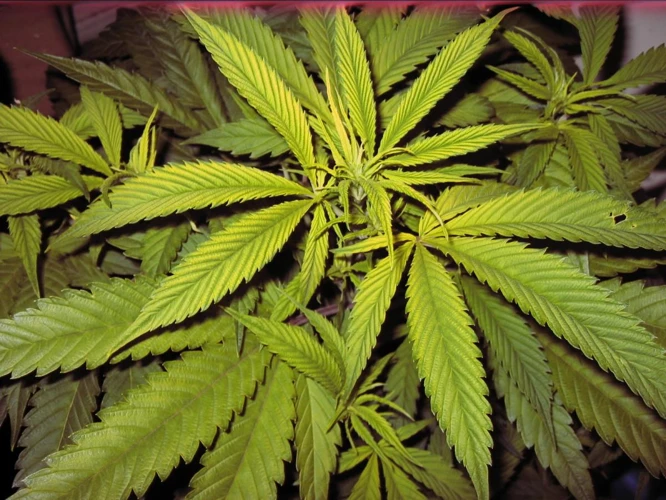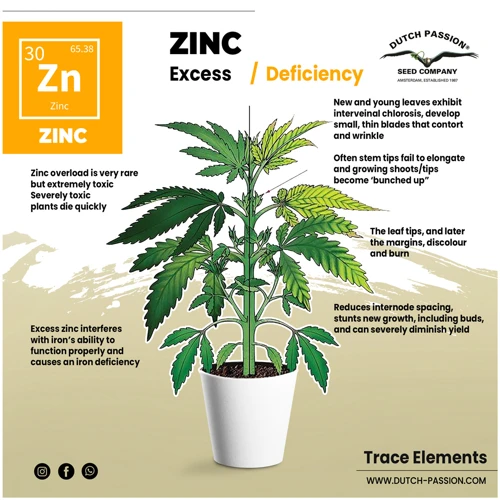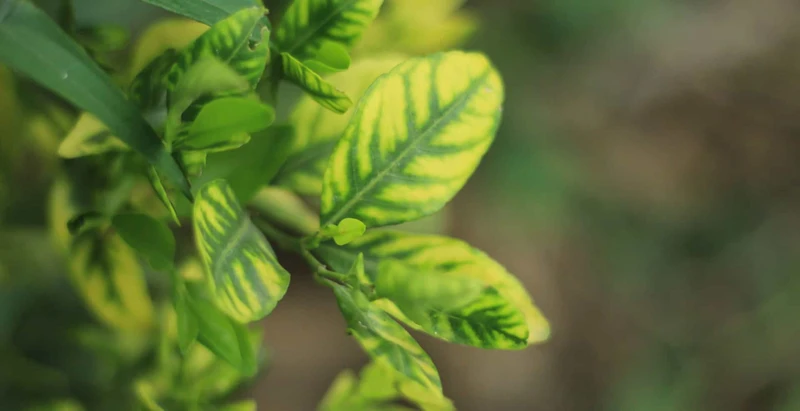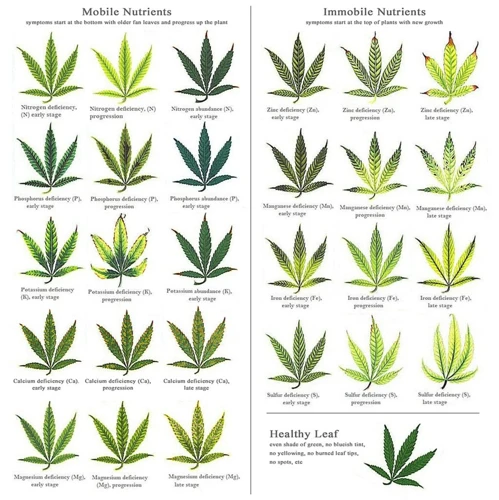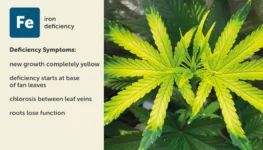
Zinc Deficiency in Cannabis Plants
As a cannabis cultivator, you are likely familiar with the numerous challenges that can arise during the growth and development of your plants. However, when faced with unexpected issues, it can be difficult to pinpoint the root cause and determine the appropriate course of action. One such problem is zinc deficiency in cannabis plants. This perplexing issue can result in stunted growth and decreased yield, leaving growers scratching their heads in bewilderment. In this article, we will explore the symptoms, causes, identification, and treatment of zinc deficiency in cannabis plants, as well as strategies for preventing it from occurring in the future.
What is Zinc Deficiency?
Contents
When it comes to growing healthy and robust cannabis plants, zinc is a crucial nutrient that shouldn’t be overlooked. Zinc is an essential micronutrient that is needed in small quantities by plants for proper growth and development. It plays a vital role in many metabolic processes, including photosynthesis, protein synthesis, and hormone regulation. Zinc deficiency is a common problem that can affect cannabis plants, and it’s essential to know the symptoms and causes of this condition to address it promptly.
Symptoms of Zinc Deficiency in Cannabis Plants
Zinc is an essential mineral for the healthy growth and development of cannabis plants. When there is a deficiency of zinc, the plants will begin to show visible symptoms that can be easily identified. Here are some common symptoms of zinc deficiency in cannabis plants:
| SYMPTOMS | DESCRIPTION |
|---|---|
| Chlorosis | The leaves of the plant turn yellow, with the veins remaining green. This occurs due to a lack of chlorophyll production in the leaves. |
| Stunted Growth | The overall growth of the plant can be slowed or stunted due to a lack of zinc. Plants may appear smaller and less healthy than usual. |
| Reduced Yield | A plant that is deficient in zinc may produce a lower yield of buds than a healthy plant. This can be due to a lack of essential nutrients needed for proper flowering and growth. |
| Interveinal Necrosis | This occurs when the tissue between the veins of the leaves begins to die or turn brown. This can cause leaves to become brittle and break apart. |
| Weak Stems | The stems of the plant may become thin and weak due to a lack of zinc. This can cause the plant to be more prone to breakage and damage. |
If you see any of these symptoms in your cannabis plants, it is important to take action to correct the deficiency as soon as possible.
Causes of Zinc Deficiency in Cannabis Plants
One of the main causes of zinc deficiency in cannabis plants is an inadequate amount of zinc in the soil. Zinc is an essential micronutrient that cannabis plants need to grow properly. When the soil is lacking in zinc, cannabis plants cannot absorb enough of it, leading to a deficiency.
Additionally, too much phosphorus in the soil can also cause zinc deficiency. This is because phosphorus can bind to zinc, making it unavailable to plants. This is particularly problematic if the soil pH is too high, as phosphorus availability increases in alkaline conditions, exacerbating the issue.
Over-watering can also lead to zinc deficiency in cannabis plants. When the soil is constantly wet, the roots are unable to take up enough zinc, and the plant can become deficient. On the other hand, underwatering can also cause zinc deficiency, as dry soil can affect the plant’s ability to absorb nutrients, including zinc.
Lastly, degraded or compacted soil can cause zinc deficiency. This is because zinc is an immobile nutrient that cannot move through the soil easily. If the soil is compacted, zinc can become trapped, leading to a deficiency. Similarly, degraded soil that lacks organic matter can also have low zinc availability.
Identifying Zinc Deficiency in Cannabis Plants
As growers, it’s important to keep a close eye on our cannabis plants to ensure they are healthy and thriving. Zinc deficiency is a common issue that can affect cannabis plants, but it’s not always easy to identify. Fortunately, there are a few visual symptoms and soil tests that can help us detect if our cannabis plants lack zinc. Let’s take a closer look at how to identify zinc deficiency in cannabis plants.
Visual Symptoms of Zinc Deficiency in Cannabis Plants
Zinc deficiency in cannabis plants is easily identifiable through certain visual symptoms. It is important to take note of these symptoms because diagnosing the deficiency early can prevent further damage to the plant. Here are some visual symptoms of zinc deficiency in cannabis plants:
| Visual Symptoms | Description |
|---|---|
| Chlorosis | Yellowing of the leaves starts at the base and progresses upwards. The veins remain green while the interveinal areas turn yellow. |
| Necrosis | Brown, dry patches or spots appear around the edges of the leaves and extend to the entire leaf if the deficiency is not treated. |
| Stunted Growth | The plant will grow more slowly than usual, and buds and leaves will be smaller than normal. |
| Distorted Leaves | The new leaves will be small and wrinkled or have a distorted shape. |
| Slow Development | The plant’s overall development will be slower than normal, and growth will stagnate. |
If you notice any of these symptoms in your cannabis plants, you might have a zinc deficiency. It is important to remedy this deficiency as soon as possible to restore the plant’s growth and prevent any further damage.
Testing Soil for Zinc Deficiency
Testing the soil for Zinc Deficiency is an important step in identifying the root cause of the problem in cannabis growth, as it allows growers to determine the levels of Zinc available in the soil. A soil test can help determine if Zinc is lacking or present in excess.
There are a few different methods for testing soil for Zinc Deficiency, including soil analysis and leaf tissue analysis. Soil analysis involves taking a sample of soil from the growing area and sending it for testing. The results will show the nutrient levels in the soil, including Zinc, and the pH level.
Leaf tissue analysis involves taking a sample of the leaves from the cannabis plant and sending them for analysis. The results will show the nutrient levels in the plant’s tissues, including Zinc, and can be used to diagnose nutrient deficiencies.
Below is a comparison of the pros and cons of these two methods of testing soil for Zinc Deficiency:
| Soil Analysis | Leaf Tissue Analysis |
|---|---|
| Pros: | Pros: |
| – Measures Zinc and other nutrient levels in the soil | – Measures Zinc and other nutrient levels in the plant tissue |
| – Can detect soil pH level | – Provides a snapshot of the plant’s nutrient status at the time the sample was taken |
| – Provides a baseline for future soil testing and fertilization | – Can diagnose nutrient deficiencies |
| Cons: | Cons: |
| – Can be time-consuming and costly | – May not provide a complete picture of nutrient levels in the soil |
| – May not accurately reflect nutrient availability to the plant | – May not detect deficiencies in mobile nutrients like Zinc |
Regardless of the method chosen, testing the soil for Zinc Deficiency can help growers better understand the nutrient profile of their growing medium and provide valuable information for addressing deficiencies or excesses. It is an essential tool for maintaining a healthy and productive cannabis garden.
Treating Zinc Deficiency in Cannabis Plants
Addressing a zinc deficiency in cannabis plants can be a challenging task, but it is crucial to ensure optimal growth and yield. Fortunately, there are several effective solutions to this problem. By carefully following the steps below, growers can provide their plants with the necessary zinc and prevent further damage. Let’s delve into some of the ways to treat a zinc deficiency in cannabis plants.
1. Add Zinc to the Soil
One effective way to treat Zinc Deficiency in Cannabis Plants is to add Zinc directly to the soil. Zinc sulfate or Zinc chelate may be used for this purpose. Zinc sulfate is a water-soluble fertilizer that can be mixed with water and poured directly onto the soil around the plant. On the other hand, Zinc chelate is a more expensive but effective solution as it is already chelated with Iron and will be absorbed more easily by the plant.
When adding Zinc to soil, it is important to follow the manufacturer’s recommendations for the appropriate dosage and application method. Applying too much zinc can be just as harmful as not applying enough. An excess of Zinc can interfere with the uptake of other essential nutrients, leading to nutrient imbalances in the plant.
Zinc can also be applied through foliar spraying, though this method is not as effective as applying it directly into the soil. Zinc should be applied to the leaves during the early stages of plant growth as Zinc is immobile in the plant’s system, and once symptoms are visible, it may be too late.
The following table shows the recommended dose of Zinc for Cannabis Plants:
| Soil Type | Zinc Sulfate (per 100 square feet) | Zinc Chelate (per gallon of water) |
|---|---|---|
| Sandy Soil | 2 pounds | 0.5 – 1.0 gram |
| Loamy Soil | 3 pounds | 1.0 – 2.0 grams |
| Clay Soil | 4 pounds | 2.0 – 3.0 grams |
It is important to note that Zinc application may take between 2-4 weeks to be fully absorbed by the plant, so patience should be exercised when waiting for visible results. Additionally, Zinc application should not be the only solution used if the Zinc Deficiency is caused by an underlying pH imbalance or other nutrient deficiency.
2. Adjust pH Levels
Maintaining the proper pH level in the soil is essential for the plant to absorb nutrients effectively. Zinc availability is highly influenced by soil pH levels. Cannabis plants prefer a slightly acidic soil with a pH range of 6.0 to 6.5. When the pH level of the soil is too high or too low, it can result in a zinc deficiency. Adjusting the pH levels is necessary to resolve the issue of zinc deficiency.
Here are the steps to adjust the pH level of the soil:
- Measure the pH level of the soil: pH level of the soil can be tested using a pH meter or pH strips. The ideal pH range for growing cannabis is between 6-7. If the pH level is outside this range, it needs to be adjusted.
- Adding natural pH adjusters: Different natural substances can be used to adjust the pH level of the soil. For instance, sulfur can be added to lower the soil pH, while lime can be added to raise the soil pH levels. The amount of adjuster required will depend on the current pH value of the soil and the desired pH level.
- Adjust in small increments: It’s crucial to adjust the pH level in small increments. Rapid changes in pH levels can damage the plants. Adjust in 0.1 increments and wait for a few days to allow the soil to stabilize before adjusting it again.
- Re-test the pH level: Once the soil pH level is adjusted, re-test the soil pH level before introducing any further nutrients.
By adjusting the soil pH level, the plant will be able to absorb zinc effectively, which will help to resolve the issue of zinc deficiency. However, it should be noted that adjusting the pH level alone might not entirely solve the deficiency issue. It should be used in conjunction with other solutions, such as adding zinc to the soil or using zinc-fortified fertilizers.
3. Use Zinc-Fortified Fertilizers
One of the most effective solutions to treat Zinc deficiency in Cannabis plants is the use of Zinc-Fortified Fertilizers. These fertilizers are specifically designed to provide essential nutrients to the Cannabis plants, including Zinc. The Zinc-fortified fertilizers come in various forms, such as granules, powders, and liquids, and can be mixed with the soil or applied directly to the plants.
One of the benefits of using Zinc-fortified fertilizers is that they improve the overall health and growth of the Cannabis plants. These fertilizers contain a balanced amount of essential nutrients that promote healthy plant growth and development.
When using Zinc-fortified fertilizers, it’s essential to follow the instructions carefully. Overuse of these fertilizers can cause toxicity and damage to the plants. It’s recommended to start with a small amount of fertilizer and gradually increase the dosage as per the requirements of the Cannabis plants.
Below is a table that lists some of the commonly used Zinc-fortified fertilizers for Cannabis plants:
| Fertilizer | Composition | Usage |
|---|---|---|
| Jobe’s Organics Vegetable & Tomato | 4-4-4 | Mix with soil or apply directly to plants every 4-6 weeks |
| Osmocote Smart-Release | 15-9-12 | Add to soil during planting or top dress every 6 months |
| Burpee Organic Bone Meal Fertilizer | 3-15-0 | Mix with soil during planting |
It’s important to note that the choice of fertilizer may vary depending on the specific requirements of the Cannabis plants. It’s always best to seek expert advice before selecting a Zinc-fortified fertilizer for the plants.
Preventing Zinc Deficiency in the Future
As you’ve learned in the previous sections, Zinc deficiency can cause significant damage to your cannabis plants. However, the good news is that there are measures you can take to prevent Zinc deficiency in the future. By implementing the following precautionary measures, you can significantly reduce the risk of Zinc deficiency, ensuring healthy growth of your cannabis plants.
1. Proper Soil Preparation
Proper soil preparation is crucial for preventing zinc deficiency in cannabis plants. Here are some steps to ensure that your plants have a healthy foundation to grow in:
- Test your soil: Testing the soil will give you information about its pH levels and nutrient content. This information will help you determine whether you need to add any amendments to the soil, including zinc.
- Amend soil if necessary: If your soil is deficient in zinc, you can add supplements like zinc sulfate or zinc oxide to the soil. Be careful not to add too much, as too much zinc can be toxic to your plants.
- Add organic matter: Adding organic matter to the soil, such as compost or manure, can improve the soil’s fertility and nutrient content. This can also help the soil retain moisture, which is important for healthy plant growth.
- Avoid compacted soil: Compacted soil can make it difficult for water and nutrients to penetrate the soil. This can lead to nutrient deficiencies, including zinc. Make sure to aerate the soil regularly to prevent compaction.
- Ensure proper drainage: Proper drainage is important to prevent water from pooling around the roots and causing root rot. This can also contribute to nutrient deficiencies, including zinc.
By properly preparing the soil, you can provide your cannabis plants with the nutrients they need to grow healthy and strong, while also preventing zinc deficiency.
2. Balanced Nutrient Intake
Balanced nutrient intake is crucial for preventing zinc deficiency and maintaining healthy cannabis plants. Ensuring plants receive all the necessary nutrients helps them grow well and build up resistance to diseases and other environmental stresses.
One way to achieve balanced nutrient intake is by using a complete fertilizer that contains all essential plant nutrients such as nitrogen, phosphorus, potassium, calcium, zinc, iron, and others. This type of fertilizer is especially helpful for fast-growing plants like cannabis that require high quantities of nutrients.
Another way to balance nutrient intake is by providing compost or organic matter to the soil. Compost gradually releases nutrients into the soil, providing plants with a steady supply of nutrients to facilitate proper growth.
Adding soil amendments like vermicompost, bone meal, or blood meal are also great for balancing the nutrient intake. These amendments provide essential potassium, calcium, nitrogen, and phosphorus, making them important supplements to the soil.
Regular monitoring of the nutrient levels in the soil is essential to ensure that plants are not lacking in any nutrient. Soil tests can determine which nutrients are deficient or over-abundant in the soil. By consulting the test results, growers can apply appropriate fertilizers or soil amendments to balance nutrient levels.
To prevent zinc deficiency in cannabis plants, maintaining a balanced nutrient intake is vital. A healthy, balanced soil provides plants with all the necessary elements for optimal growth and development, including zinc. By taking care to provide adequate nutrients, growers can prevent zinc deficiency and help their plants reach their full potential.
3. Regular Soil Testing
Regular soil testing is an essential part of preventing zinc deficiency in cannabis plants. By testing the soil, you can determine if the pH level and nutrient levels are balanced or if any zinc deficiency is likely to occur. It is necessary to make soil testing a regular habit instead of waiting for visible symptoms to appear.
What are the benefits of regular soil testing?
- Preventative measures: Regular soil testing allows you to identify nutrient deficiencies before they become severe, allowing you to take corrective action early on.
- Better plant growth: By ensuring the soil is balanced, you can create ideal growing conditions for cannabis plants, which will help them thrive and produce better yields.
- Cost-effective: Regular soil testing can save you money by preventing nutrient deficiencies and ensuring that you are not applying excessive, unnecessary fertilizers or supplements.
- Improved soil quality: By testing the soil regularly, you can understand the unique needs of your cannabis plants, and add organic matter to improve soil fertility when required.
How often should you test your soil?
The frequency of soil testing can depend on various factors such as the type of soil, the type of cannabis strain, and the size of the grow operation. However, it is generally recommended to test the soil every four to six months. This interval is optimal to ensure that the soil pH and nutrient levels remain balanced.
How to perform soil testing?
There are several ways to test soil at home, such as using pH test strips or soil testing kits. If you want a more comprehensive analysis, you can send a sample of your soil to a laboratory for detailed testing. This method will provide a more precise analysis of your soil’s nutrient content, pH, and other essential parameters.
Conclusion
Regular soil testing is a vital practice to prevent zinc deficiency and maintain a healthy growing environment for cannabis plants. It allows you to detect nutrient deficiencies before they impact plant growth and yields, as well as help maintain optimal soil pH and nutrient levels. It is highly recommended to make it part of your overall cannabis cultivation routine.
Conclusion
In conclusion, it is important to carefully monitor the nutrient levels in cannabis plants to prevent and address zinc deficiency. If left untreated, zinc deficiency can severely impact plant growth, yield, and quality. The symptoms of zinc deficiency, which include yellowing leaves and stunted growth, should be addressed as soon as they are identified.
There are several ways to treat zinc deficiency in cannabis plants, including adding zinc to the soil, adjusting pH levels, and using zinc-fortified fertilizers. However, prevention is the best approach, and growers can take steps to prevent zinc deficiency in the future by properly preparing the soil, ensuring balanced nutrient intake, and regularly testing the soil for deficiencies.
It is important for growers to remain vigilant and attentive to the needs of their cannabis plants, and to take proactive measures to prevent and address issues like zinc deficiency. By doing so, growers can ensure that their plants remain healthy, strong, and productive, and can maximize their potential for growth, yield, and quality.
Frequently Asked Questions
1. Can zinc deficiency affect the growth of cannabis plants?
Yes, zinc deficiency can lead to stunted growth, reduced leaf size, and poor flower development in cannabis plants.
2. How do I know if my cannabis plant is experiencing zinc deficiency?
Look out for visual symptoms such as yellowing leaves, abnormal leaf growth, and white spots on the leaves. You can also test the soil for zinc levels to confirm.
3. What causes zinc deficiency in cannabis plants?
Zinc deficiency can be caused by several factors such as poor soil quality, incorrect pH levels, and mineral imbalances in the soil.
4. Can I add too much zinc to the soil?
Yes, adding too much zinc to the soil can be toxic to cannabis plants and lead to even more problems.
5. Can I use foliar sprays to treat zinc deficiency?
No, foliar sprays are not effective in treating zinc deficiency as the nutrient needs to be absorbed through the roots.
6. Can compost be used to prevent zinc deficiency in cannabis plants?
Yes, using compost can help improve soil quality and reduce the likelihood of zinc deficiency occurring.
7. Can zinc deficiency be caused by over-watering?
Yes, over-watering can lead to zinc deficiency as it can prevent the uptake of necessary nutrients by the roots.
8. How often should I test my soil for zinc levels?
It is recommended to test your soil every growing season or every 6 months to ensure optimal nutrient levels in the soil.
9. Are there any natural remedies for treating zinc deficiency?
Yes, using natural amendments such as seaweed extract or bone meal can help provide zinc to the soil in a natural and slow-release manner.
10. Can zinc deficiency be prevented by using hydroponics?
Yes, hydroponics can prevent zinc deficiency as it allows for better control over nutrient levels and pH levels.

